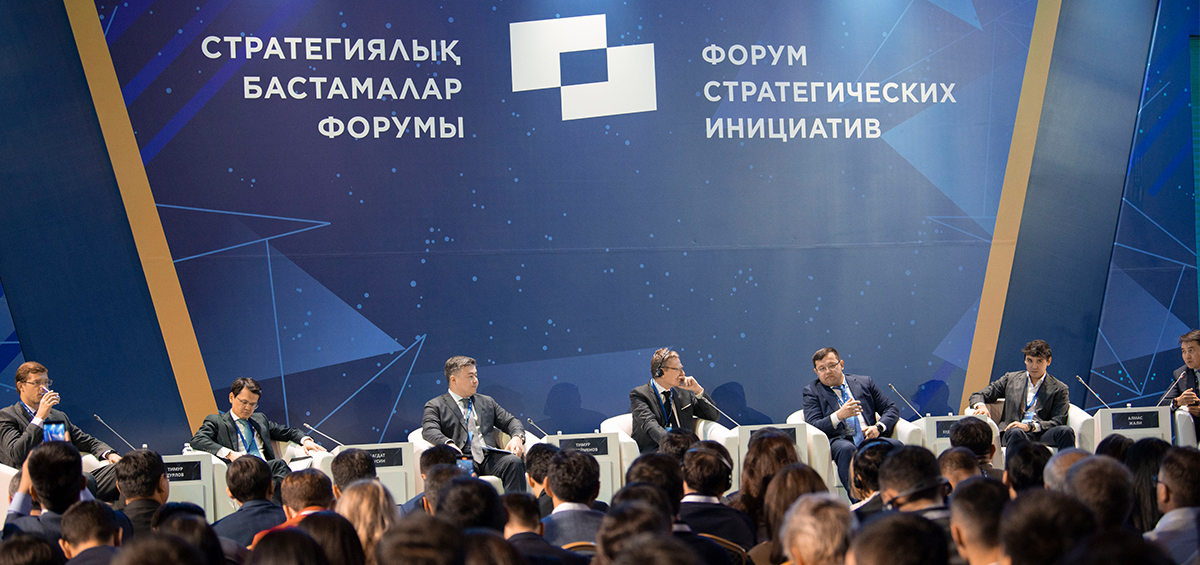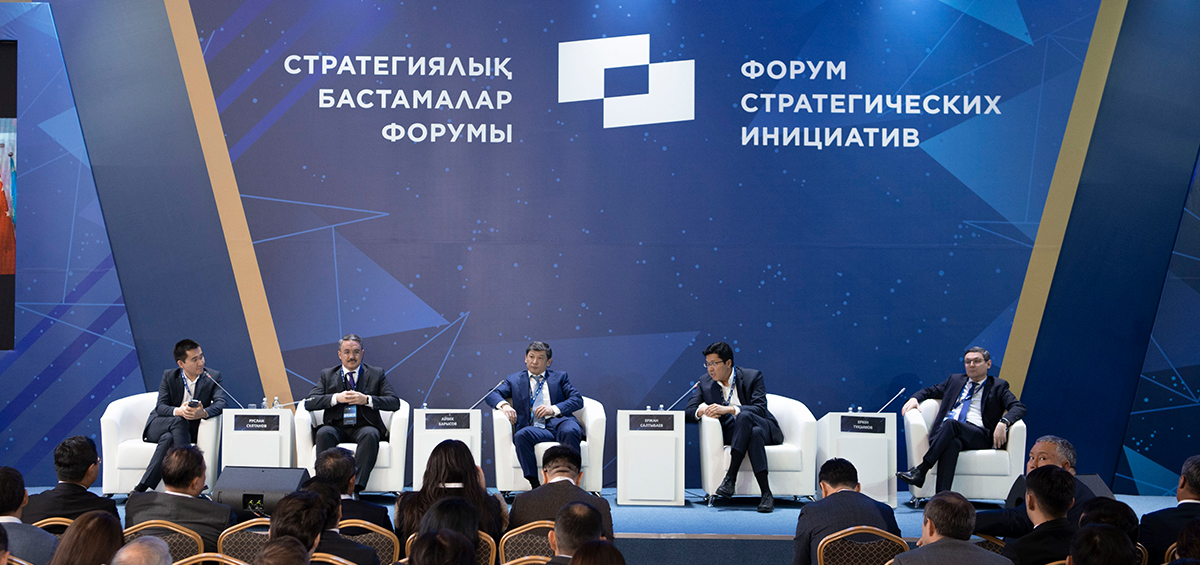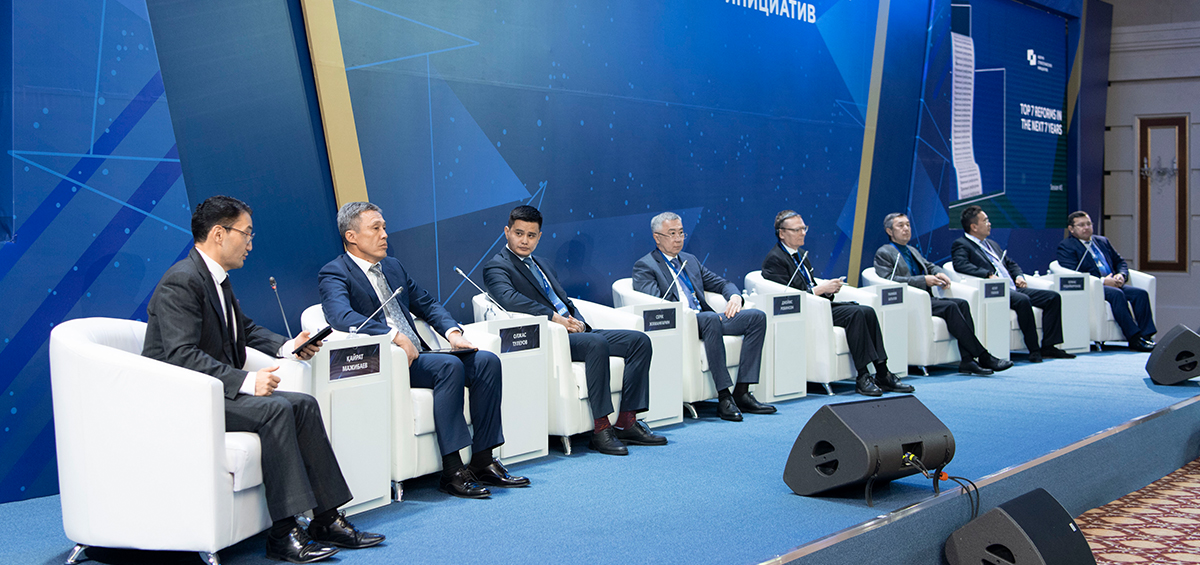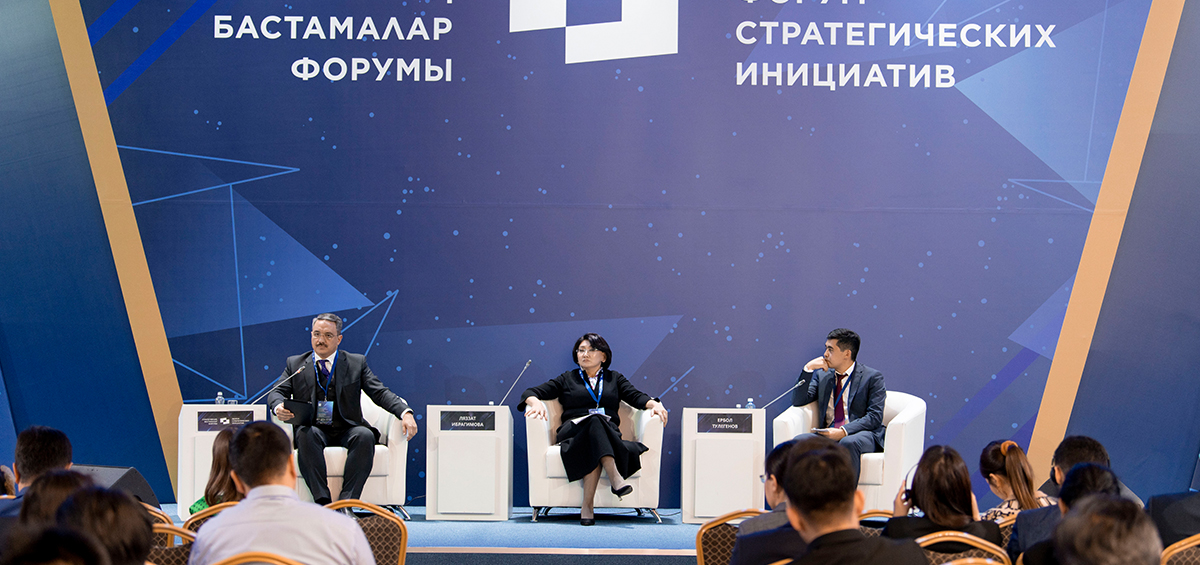THE "FUTURE BEGINS TODAY" FORUM OF STRATEGIC INITIATIVES WAS HELD IN ASTANA»
18.11.2022
The Strategic Initiatives Forum is a discussion platform for frank discussion of the country's development problems, the search for practical solutions and new "points of growth". On the 16th of November, heads of government agencies, national companies, representatives of big business, public and political figures, as well as experts in economics, politics and many others took part in the discussions. The forum was headlined by James Robinson, British economist and co-author of the bestseller "Why Are Some Countries Rich and Others Poor", and the renowned American writer and author of the economic bestsellers "Black Swan" and "Skin in the Game: Hidden Asymmetries in Daily Life" by Nassim Taleb. Organizer of the forum, senior partner of the Centre for Strategic Initiatives CSI, Olzhas Hudaibergenov, noted that this year's forum will be dedicated to discussion of topical issues that will affect the nearest future of our country «We would like to present an image of the future of Kazakhstan by 2029 - how the country will change over the next 7 years, discuss internal and external risks for the country and how they may affect its development trajectory, identify the most important reforms to be implemented and how they should be implemented. We want the decision-makers to understand the needs of society, the wishes of how the country should change in 7 years, and vice versa, so that society understands where the country can develop, what opportunities and obstacles stand in the way of development». Session N1. «Kazakhstan-2029». Image of the future  Photo by Ospan Ali Speakers: Olzhas Khudaibergenov – Senior partner of CSI Тimur Suleimenov - First Deputy Head of the Presidential Administration Тimur Turlov - Chief Executive Officer of Freedom Holding Corp. James Robinson - British economist, co-author of "Why nations fail?» Imanbek (online) - Kazakhstani DJ, music producer Аlmas Zhali (online) - Producer, Founder of Brave Talents Bagdat Mussin – Minister MDDIAIK Тimur Suleimenov - First Deputy Head of the Presidential Administration, spoke out about an important part of Kazakhstan's future: «Trust is an important factor in the image of Kazakhstan's future, its foundation. The government must trust the citizens. So should citizens trust the government. We must not be afraid of change. Fintech, creative economy and technologies are the rooms of our home, our future home. The cement of that house will be our cultural code. Multiculturalism is at the heart of that code. That is why it is important to act together, to trust each other». Prominent Kazakh entrepreneur Timur Turlov praises Kazakhstan's IT industry: «Kazakhstan is a country of techno-optimists. The technology that the guys in Kazakhstan have built together with e-government surprises even specialists in the West. You could say that there are some of the best conditions in Kazakhstan for digital creativity. Freedom's products are in high demand abroad, in Europe. It is thanks to the digital creativity developed in Kazakhstan. Trust, the ability to maintain trust, is something that Kazakhstan needs. From institutions to people - the citizens of the country. There are many talented people in the country. And they need to be given the opportunity». Session N2. «Scenarios for a geopolitical future»  Photo by Ospan Ali Speakers: Zhang Xiao (online) - Ambassador Extraordinary and Plenipotentiary of the People's Republic of China to Kazakhstan Daniel Rosenblum - US ambassador to Kazakhstan Аibek Baryssov - Chairman of the Association of Defence Industries Nassim Taleb (online) - American economist, PhD, author of Black Swan » Yerzhan Saltybayev - Director of the Institute of World Economy and Politics Yerkin Tukumov – Director of KISS Ruslan Sultanov - Chairman, Institute of Economic Research, JSC» Nassim Taleb, one of the most anticipated speakers at the Forum, assessed the prospects of Kazakhstan in the face of geopolitical uncertainty: «It happened so that historically Kazakhstan is located on the most important section of the World - the Silk Road. Therefore, because of its favorable geographical location, geopolitical events will not have a significant impact on Kazakhstan. As long as Kazakhstan protects its resources and strengthens its economic and political institutions, it will not be affected by geopolitical turbulence. Therefore, Kazakhstan will be able not only to retain but also to strengthen its position». He commented on the theory that the US and China are struggling for world domination. According to him, the US and China are highly interconnected economically. Therefore it is unnecessary to talk about any struggle for hegemony. «So what is good for China is good for the US, and the other way round. In that sense, what is good for China is good for Kazakhstan, for example. The whole world is economically interconnected. Because of this, it is impossible to identify a single center of decision-making that would dictate its will», – said Nassim Taleb. Chinese Ambassador Extraordinary and Plenipotentiary to Kazakhstan Zhang Xiao elaborates on China's involvement in global geopolitics and economics: «More than 140 countries have joined the implementation of such a global project as "One Belt, One Road". This is an undeniable contribution to the global economy. In terms of politics, China, like the U.S., is committed to multilateralism. China aims to further develop partnerships. We are against zero sum games. China is not interested in domination or hegemony. China is interested in peace and prosperity for all its partners». Ruslan Sultanov, chairman of the Board of the Institute for Economic Research, identified three main areas where Kazakhstan should pick up the pace: «One of the main messages is the issue of trust. The trust is there, where there is transparency, responsibility for decision-making, and responsiveness. Kazakhstan's economic potential is high. Inequality is rising in the world. There are problems with access to food and resources. But if Kazakhstan will be able to make the necessary decisions quickly, it will be possible to take advantage of the situation and reap the benefits». Session N3. «Top 7 reforms in the next 7 years».  Photo by Ospan Ali Speakers: Serik Zhumangarin - Deputy Prime Minister - Minister of Trade and Integration Olzhas Toleuov - Deputy Chairman of the ASIP of the Republic of Kazakhstan Raiymbek Batalov - Chairman of NPP Atameken Kairat Mazhibayev - Entrepreneur, Head of RG Brands Askhat Uzbekov - Chairman of the Board of Directors, Kcell James Robinson - British economist, co-author of "Why nations fail? Olzhas Khudaibergenov - Senior Partner at CSI Special guest of the event, the renowned British economist James Robinson, presented his recipe for building trust between the state and society during the forum. «The process of building trust is a road towards each other in this sense. Only through actual action and not through double signals can the state gain the trust of the citizens. But the state itself must also trust the population. Otherwise there is no success in this field. I see a tendency in Kazakhstan to rely on the potential of young people. Creativity comes from young people. Inclusive institutions are an important component of developing this potential, creativity. The success of the United States, for example, is that it accumulates talent. And in this sense, Kazakhstan is going in the right direction. Therefore, a vision of the future is necessary not only for the state but also for the population. But all this takes time». Robinson also identified the main challenges that Kazakhstan will need to overcome and how to address them. «Kazakhstan's goal is to build inclusive institutions and a prosperous society. Since 1999, Kazakhstan has progressed stronger in some sectors than in others. I see this as a problem of the capacity of Kazakhstan's institutions. During the Soviet period, political and economic institutions were highly personalized. The quality of institutions in Kazakhstan ranks 60th. And in order to enter the top 30 countries, it is necessary to bring them up to the level of this top 30. Therefore, firstly, we need to have administrative reforms. But you have to prioritize the sectors. It is impossible to target all sectors at once. Second, a strategic vision in politics and economics. It is important to make citizens understand that economic reforms are important. Reforms can technically be implemented, but they may face public rejection. And also by different interest groups. And this too will have to be dealt with. Thus reforms should be structured in such a way that possible 'losers' accept them. I can say that the people of Kazakhstan, given the current government course, have a choice of inclusive institutions». Deputy Prime Minister - Minister of Trade and Integration Serik Zhumangarin highlighted several key reform areas for Kazakhstan over the next 7 years: «De-globalization is the trend that defines the direction of reforms today in Kazakhstan, in the trade sector. Today, the two axes - China-US and Russia-EU - are not working properly. Therefore, Kazakhstan has to operate in this status quo and reap the corresponding benefits. The first reform is in agriculture. And it has to start with getting the statistics in line. Next, funding must be directed to the development of the agricultural sectors, and "cheap money" must be provided. In addition, control over the observance of agronomy within the industry. The use of the domestic market, the Irtysh and Ishim. And all this is to be transferred to the rails of the changed logistics of products. The second reform is trade. The main global trend here is trade going digital. This is why Kazakhstan will invest in digital trade. Trade in Kazakhstan today accounts for 18.3 percent of GDP. And this figure should not be lost. The third reform is the revision of transit and trade logistics. We are now earning on transit. However, due to the current situation, a change in corridors is taking place. And now the whole world has turned its attention to the North-South corridor, where the main role is played by quantity, not quality. So Kazakhstan is going to have to diversify profoundly. The fourth reform is the energy sector. We need to determine the source of raw materials. There are not many choices. There is a problem with gas, for example. We will not be able to use it for the same diversification projects if we place our main bets on it. Of course, there will still be coal, which is needed for the needs of the population but not for production. There is also uranium. Then there are renewable energy sources, such as hydropower. There is no solution to the regulation of this source. The fifth reform is education. The main issue is where to get enough teachers. Perhaps vocational guidance should be introduced in fifth grades. In order to separate the streams. Since each stream will be taught subjects in different degrees, depending on the chosen streams. This will partly solve the deficit problem. The sixth reform is public administration within the framework of state support. We have a large amount of social support. But tomorrow it may start to hamper development programs. So it is targeted support that needs to be strengthened. This is why the state will start to optimize itself. On the basis of big data, to study the feedback. Now the proactive charging of services has started». Session N4 - « The Great Migration. Migration challenges of the future»  Photo by Ospan Ali Speakers: Sayasat Nurbek (online) - Minister of Science and Higher Education of Kazakhstan Kumar Aksakalov (online) - Akim of North Kazakhstan Oblast Lyazzat Ibragimova - Chairman of JSC Otbasy Bank Yerbol Tulegenov - Junior Partner, CSI The Akim of the NKO, Kumar Aksakalov, commented on the situation of migrants from Russia during his speech. «From 25 September to 21 October there was a big surge from the Russian Federation. Out of 92.5 thousand Russian citizens, 1.3 thousand applied for the right to stay for one year, and only 600 Russian citizens were approved for such a request. Therefore, it can be said that everything is proceeding without excesses». Minister of Science and Higher Education Sayasat Nurbek talks about the potential of labor migration for education in Kazakhstan. «We can see the pressure on the education system starting to mount. Both from within and from outside. By 2030, we expect up to 1 million students to study in Kazakhstan. Kazakhstan is not ready for such a large one-stage flow. The issue of dormitories is hitting hard. There is a shortage of 87,000 beds. In this crisis situation, we have a unique opportunity. A large number of scientists at the top levels are looking for opportunities to pursue an academic career, including in Kazakhstan. We in the Ministry are now engaged in a careful dialogue to invite them to Kazakhstan. In the next three to five years, Kazakhstan will become a powerful academic hub». Lyazzat Ibragimova, chairman of Otbasy Bank, commented on the housing market in Kazakhstan. «We have 6.3 million homeowners per 19 million people - a good result for 30 years of Kazakhstan's independence. Despite labor and other migration, the real estate market will stabilize. The country can handle up to 1 million one-time migrants at most. Such a level is not observed now». At the Strategic Initiatives Forum, Olzhas Khudaibergenov presented "10 Shocking Forecasts". Read about it in the next article.
Views: 5995 |
|
||||||||||||||||||||||||||||||||||||||||||||||||||||||||||||||||||||||||||||||||||||||||||||||||||||||||||||||||||||||||||||||||






|